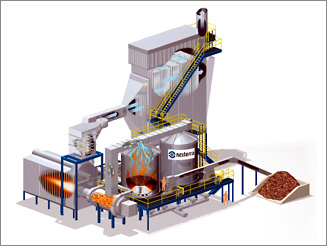Biomass Gasifier at Kruger Tissue Mill Saves $1 Million Annually, Cuts GHG Emissions
 The Kruger tissue mill in New Westminster, B.C., Canada, recently installed a new Nexterra biomass gasification system. As described in a recent report by Wood News Now (WNN), Victoria, B.C., which visited the mill, the direct-fired Nexterra system uses woody biomass as fuel and provides about half of the mill’s process steam supply. The system saves about $1 million in natural gas costs per year and cuts GHG emissions and carbon emissions taxes, the WNN report notes.
The Kruger tissue mill in New Westminster, B.C., Canada, recently installed a new Nexterra biomass gasification system. As described in a recent report by Wood News Now (WNN), Victoria, B.C., which visited the mill, the direct-fired Nexterra system uses woody biomass as fuel and provides about half of the mill’s process steam supply. The system saves about $1 million in natural gas costs per year and cuts GHG emissions and carbon emissions taxes, the WNN report notes.
The yearly fuel supply of 40,000 metric tons is delivered milled down to 3-in. pieces at 40% to 65% moisture. With local sawmills curtailing production, hog fuel is supplemented with municipal and other waste wood. The biomass is stored and metered in a closed fuel reclaim system from Continental Conveyors.
The Nexterra system consists of two 16-ft gasifiers inline. Combustion of biomass in the gasifiers produces syngas that is direct-fired into the boiler to produce steam. The Kruger system has a pre-ignition chamber between the gasifiers and the boiler that is used to blend the syngas with combustion air before it enters the boiler. The boiler currently produces 40,000 lb/hr of steam with a potential capacity of 60,000 lb/hr, the WNN article reports. Target combustion temperature in the gasifiers is about 1,000o C (1,900o to 2,000o F), which provides the most complete combustion of fuel and VOCs.
 The constrained mill site presented some design challenges, the WNN article continues. The gasifiers were mounted at an angle to fit into the tight space. Also, the area is in a high seismic zone and seismic construction requirements had to be met. Space also was allowed for potential expansion of the system with another boiler. Because the plant is just a stone’s throw from downtown New Westminster, it had to be one of the cleanest biomass facilities ever. Particulate emissions are virtually nil and other emissions are extremely low, according to the WNN report.
The constrained mill site presented some design challenges, the WNN article continues. The gasifiers were mounted at an angle to fit into the tight space. Also, the area is in a high seismic zone and seismic construction requirements had to be met. Space also was allowed for potential expansion of the system with another boiler. Because the plant is just a stone’s throw from downtown New Westminster, it had to be one of the cleanest biomass facilities ever. Particulate emissions are virtually nil and other emissions are extremely low, according to the WNN report.
TAPPI
http://tappi.org/
 The Kruger tissue mill in New Westminster, B.C., Canada, recently installed a new Nexterra biomass gasification system. As described in a recent report by Wood News Now (WNN), Victoria, B.C., which visited the mill, the direct-fired Nexterra system uses woody biomass as fuel and provides about half of the mill’s process steam supply. The system saves about $1 million in natural gas costs per year and cuts GHG emissions and carbon emissions taxes, the WNN report notes.
The Kruger tissue mill in New Westminster, B.C., Canada, recently installed a new Nexterra biomass gasification system. As described in a recent report by Wood News Now (WNN), Victoria, B.C., which visited the mill, the direct-fired Nexterra system uses woody biomass as fuel and provides about half of the mill’s process steam supply. The system saves about $1 million in natural gas costs per year and cuts GHG emissions and carbon emissions taxes, the WNN report notes.  The constrained mill site presented some design challenges, the WNN article continues. The gasifiers were mounted at an angle to fit into the tight space. Also, the area is in a high seismic zone and seismic construction requirements had to be met. Space also was allowed for potential expansion of the system with another boiler. Because the plant is just a stone’s throw from downtown New Westminster, it had to be one of the cleanest biomass facilities ever. Particulate emissions are virtually nil and other emissions are extremely low, according to the WNN report.
The constrained mill site presented some design challenges, the WNN article continues. The gasifiers were mounted at an angle to fit into the tight space. Also, the area is in a high seismic zone and seismic construction requirements had to be met. Space also was allowed for potential expansion of the system with another boiler. Because the plant is just a stone’s throw from downtown New Westminster, it had to be one of the cleanest biomass facilities ever. Particulate emissions are virtually nil and other emissions are extremely low, according to the WNN report.